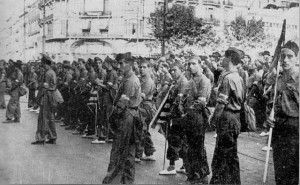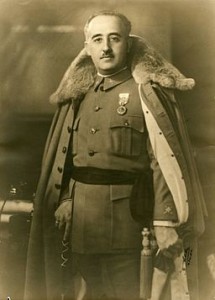Historical mystery author Kathleen Heady discusses the Spanish Civil War, which claimed the lives of volunteer fighters from all over the world, including gifted British artist Felicia Browne.
~~~
 Relevant History welcomes Kathleen Heady, author of three mystery novels featuring Nara Blake, a woman from a Caribbean island who moves to England. Kathleen’s work in progress takes Nara to Spain, where she learns about Felicia Browne, a British woman who died fighting Fascists in the Spanish Civil War. Kathleen lives in North Carolina with her husband and two cats. Her house looks out on Carolina woods, almost fulfilling her childhood dream of living in a tree house. To learn more about her and her books, visit her web site, and follow her on Facebook and Goodreads.
Relevant History welcomes Kathleen Heady, author of three mystery novels featuring Nara Blake, a woman from a Caribbean island who moves to England. Kathleen’s work in progress takes Nara to Spain, where she learns about Felicia Browne, a British woman who died fighting Fascists in the Spanish Civil War. Kathleen lives in North Carolina with her husband and two cats. Her house looks out on Carolina woods, almost fulfilling her childhood dream of living in a tree house. To learn more about her and her books, visit her web site, and follow her on Facebook and Goodreads.
*****
My second novel, Lydia’s Story, tells the story of a young British woman who becomes a spy during World War II. Although a wife and mother herself, she risks her life to travel behind German lines in France to bring Jewish children across the Pyrenees Mountains into the relative safety of neutral Spain.
 As I began research for my current work in progress, I felt drawn to that beautiful part of the world that straddles France and Spain, and the time period leading up to World War II. I looked for a connection between Britain, Spain, and the art world. This led me to discover the story of a woman named Felicia Browne, the first British volunteer and only British woman to die in the Spanish Civil War.
As I began research for my current work in progress, I felt drawn to that beautiful part of the world that straddles France and Spain, and the time period leading up to World War II. I looked for a connection between Britain, Spain, and the art world. This led me to discover the story of a woman named Felicia Browne, the first British volunteer and only British woman to die in the Spanish Civil War.
A gifted and trained artist, Felicia Browne traveled to Berlin in 1928 to study metalwork. She had a chance to witness events in Germany in the late 1920s, and as a result became extremely anti-fascist. From that point on, she devoted her life to political activism, putting her art on a back burner. She traveled through Europe, aided by her ability to speak four languages, and often earned money by sketching portraits of villagers in remote areas she visited. Browne returned to England in the early 1930s, but her interest and her heart remained with the people of Europe who were struggling under increasingly repressive governments.
In 1936, she and a friend set out on a driving trip across France to Barcelona, where they planned to attend the People’s Olympiad, which was the socialist response to the Olympic Games being held in Berlin that summer. But these games turned out to be the “Olympics That Never Happened,” as the Spanish Civil War broke out, plunging Barcelona into violence.
Browne argued her way into the PSUC (Catalan Communist) Karl Marx Militia to fight against the Fascist forces. The leaders were strongly against a woman joining their fighting force, but she convinced them to give her a chance, stating that she could fight as well as any men. The leaders relented, and she set out with a band of militia members who were determined to dynamite a Fascist munitions train.
On 25 August 1936, near the Spanish town of Tardienta, in Aragon, Felicia Browne’s raiding party was ambushed. She was shot dead as she attempted to pull a wounded Italian comrade to safety. Due to the heavy gunfire, the other members of the raiding party were unable to retrieve her body or that of the comrade she was trying to rescue.
They did, however, retrieve one of her notebooks. Eventually the notebook was sold by the International Artists Association, and the proceeds were used to raise money for Spanish relief.
 The period of the Spanish Civil War is one that is still difficult to understand. It was a tragedy for the Spanish people and many others who volunteered to help the Spanish fight for freedom from fascism. The period included the tragic bombing of Guernica, immortalized in Pablo Picasso’s moving painting which hangs in the Museo Reina Sofia in Madrid. General Francisco Franco, who led the military coup against the elected republican government, eventually won the conflict and remained in power as a dictator until his death in 1975.
The period of the Spanish Civil War is one that is still difficult to understand. It was a tragedy for the Spanish people and many others who volunteered to help the Spanish fight for freedom from fascism. The period included the tragic bombing of Guernica, immortalized in Pablo Picasso’s moving painting which hangs in the Museo Reina Sofia in Madrid. General Francisco Franco, who led the military coup against the elected republican government, eventually won the conflict and remained in power as a dictator until his death in 1975.
It is unknown exactly how many people, Spaniards as well as volunteer fighters from many countries around the world, including the Lincoln Brigade from the US, lost their lives in this senseless war. Felicia Browne was only one, but one who deserves to be remembered. Here’s an exhibit of her work held at the Tate Museum in London.
*****
 A big thanks to Kathleen Heady! She will give away a paperback copy of Lydia’s Story to two readers who contribute comments on my blog. I’ll choose the winners from among those who comment by Friday at 6 p.m. ET. Delivery is available worldwide.
A big thanks to Kathleen Heady! She will give away a paperback copy of Lydia’s Story to two readers who contribute comments on my blog. I’ll choose the winners from among those who comment by Friday at 6 p.m. ET. Delivery is available worldwide.
**********
Did you like what you read? Learn about downloads, discounts, and special offers from Relevant History authors and Suzanne Adair. Subscribe to Suzanne’s free newsletter.

Interesting article. As it turns out, the Spanish Civil War was a practice war for WW2.
Quite true.
I’m reading a work of fiction, The Red Gene, set in Spain and about a nurse who volunteers during the civil war. So many brave women largely unsung. Look forward to reading your book.
Thank you! Yes, I am interested in learning more about these women as well.
So many brave women!
Yes, and important that we know more about them.
One can’t help wondering what Felicia Browne would have thought of the repression by her comrades in those countries that they seized. Two great evils clashed in Spain.
Yes. The early Communists in Europe were very idealistic.
Kathleen Heady’s post is informative and sad. Over the decades, I’ve read a few non-fiction books on the Spanish Civil War and felt it was tragic that some governments were willing to ignore what was happening. Could WW2 have been averted in Spain? I always wonder what could have happened – if some politicians were as brave as the volunteer fighters in the International Brigades.
Very good point about the politicians. It is a very sad episode, as every war is.
Me too Roland. I live in Spain and believe me it keeps me awake at night. A difficult question, no easy solution and plenty of guilty parties.
In a way all wars are senseless – but that word may give a false impression. It was morally, politically and spiritually right for the international brigaders to help the Spanish republic resist Franco and his Nazi and Fascist supporters. If Britain and France had not defied international law by refusing aid to help the Spanish government, Franco would have been defeated, the second world war would never have happened, and the world would be safer and happier today.
You write ‘They did, however, retrieve one of her notebooks. Eventually the notebook was sold by the International Artists Association, and the proceeds were used to raise money for Spanish relief.’
A collection of her art works was sold. I doubt that these were in a notebook on her body when she was fighting; presumably they were gathered back in Barcelona or elsewhere. You can see the booklet of artworks sold by IAA at https://archive.org/details/DrawingsFeliciaBrowne. (She is a distant cousin of mine).